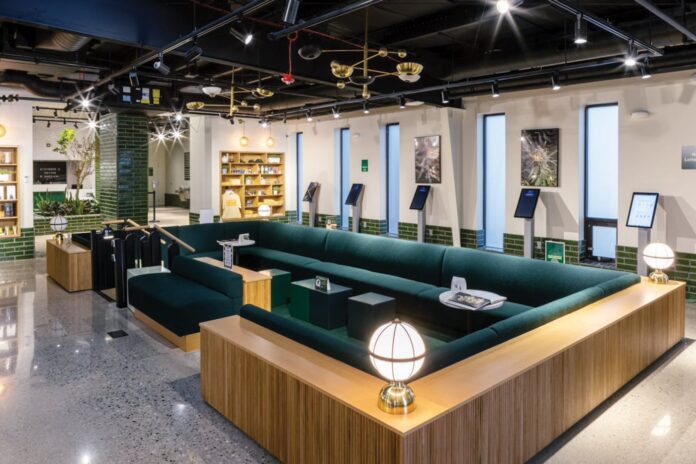As medical and recreational cannabis legalization continues to sweep across the United States, stakeholders are realizing profit can be made by providing a safe space for patients and recreational users to consume the cannabis they’ve legally purchased. Besides the profit angle, an increasing number of states are considering whether social consumption lounges can reduce the nuisance of and necessity to police public cannabis consumption. In addition, lounges can attract tourists and drive municipal and state revenue streams.
For those interested in opening a social consumption lounge, the first consideration is whether the state allows them. If it does, the next step is understanding the necessary regulations and requirements, all the way from license application to becoming operational.
In general, if you charge an entry fee and allow cannabis consumption on the premises of a nonresidential location and/or sell goods or services on site while individuals are consuming cannabis, you’ll need a special license. Every state handles social consumption lounges a little differently. Some require the businesses be operated by an existing licensee, such as a dispensary or licensed retail cannabis store. Visit your state’s cannabis regulatory website for specific information. Some states have well-organized, transparent regulatory sites; others are trickier and may necessitate hiring an attorney or consultant to make sense of the rules and regulations that apply to your unique situation.
Will your lounge be “bring your own cannabis,” or will you sell products? There’s little financial incentive to jump through regulatory hoops if you can’t sell cannabis. That would be like opening a bar and not being able to sell beer, right? Only you can decide whether opening a BYOC lounge makes sense. Although some states may not allow cannabis sales in lounges, they may allow premises licensed for consumption to sell non-infused food, drinks, and smoke-shop products, which may make the venture worth your time and resources.
If you choose to stay away from the BYOC model, will you offer tried-and-true pre-rolls, flower for vaping, edibles, and tinctures? What about newer, innovative products like microdosed beverages or sublingual strips? How will you keep your inventory secure? Will you have daily, weekly, or monthly specials? How will you display products? Turn to state and municipal regulations to figure out what is allowed and how you must account for and report your inventory.
Will your operation be members-only or open to the public? In some states, it’s easier to open a members-only social consumption club than a licensed, open-to-the-public consumption lounge. Do your research to figure out what’s allowed in your state and where the best entry point may be for your circumstances and goals.
Will your lounge feel like a daytime coffee house or a nighttime bar or speakeasy? Will customers sit with laptops or hang with their buddies? What kind of music will play in the background? What other products will you sell? Who will be your target customer? Answers to these questions will help you formulate your business plan and complete licensure applications.
Should education be part of your plan? If your goal is to attract tourists and the general public, absolutely. Some legislators are interested in social consumption lounges because they provide safe venues for new cannabis customers to ask questions and choose the products best suited to their goals. Are they looking to alleviate pain, increase energy, or chill out? Better to talk with a trusted flower specialist or budtender rather than some guy in the back corner of a park. On the other hand, if you’re targeting connoisseurs comfortable with all things cannabis, you can place less emphasis on education and newbie customer service and more on product selection. In both cases, just like bartenders, social consumption lounge employees should be trained to look out for and prevent overconsumption.
Once you identify your target customer, vibe, and educational/customer service level, it’s time to turn to more regulated matters. Many states require a specialized odor-removal HVAC to scrub the air before it’s released to the outside. Besides keeping neighbors happy, odor-mitigation systems increase security by not alerting passersby to the presence of cannabis. When considering an odor-mitigation system, check the regulations. Some states require such systems in every space within the lounge, while others allow one system to take care of the entire premises.
Other regulations outside the nuts and bolts of consumption-lounge licensing come into play as well. Research what you can and cannot do in terms of advertising, verifying customer ages and IDs, handling green and non-green waste, inventory storage and auditing, preventing theft and diversion, training employees, installing proper lighting and air filtering systems, reporting, running an environmentally sustainable business, and more. Address each item in a business and operational plan, and use the information to build or renovate the facility, hire and train employees, and compliantly serve customers.
For some, the above measures will seem reasonable. Others just want to open a consumption lounge and get on with it. While the list of regulations can be long, paying attention will help you build a legal organization that hopefully will operate profitably for many years. Better yet, you will help the cannabis industry take one more step toward professionalization on the road to becoming an industry that is considered trustworthy and mindful of the need to protect its customers and communities.

Dede Perkins, cofounder and CEO at ProCanna, joined the cannabis industry in 2013 as a member of the team that won one of the first vertically integrated licenses in Massachusetts. After that, she helped win cannabis licenses in New York, Maryland, Pennsylvania, Ohio, California, Arkansas, North Dakota, and Nevada. A regulatory specialist, she is passionate about combining compliance with operational excellence.
Procanna-USA.com













